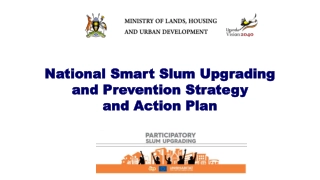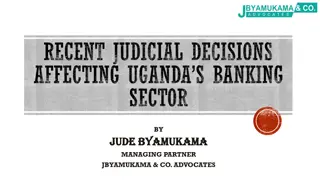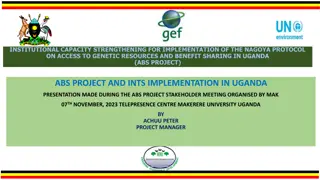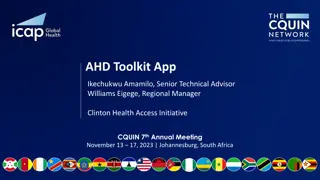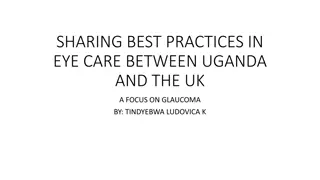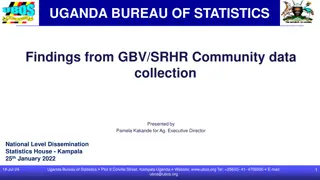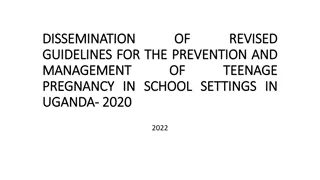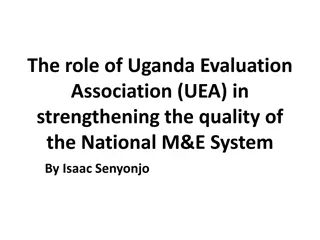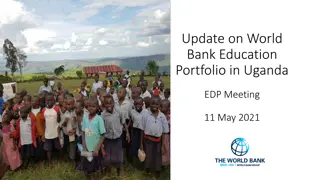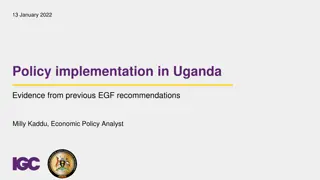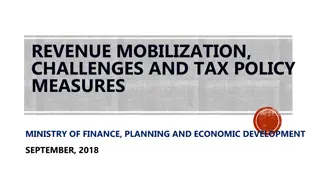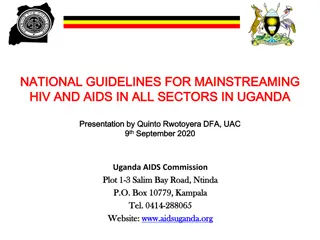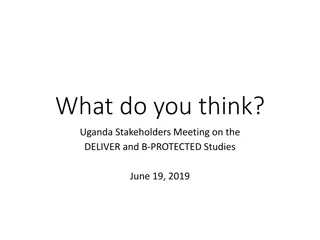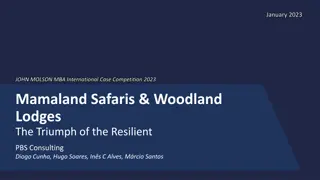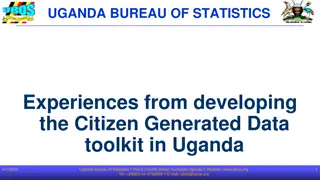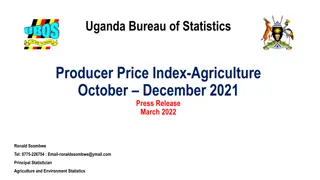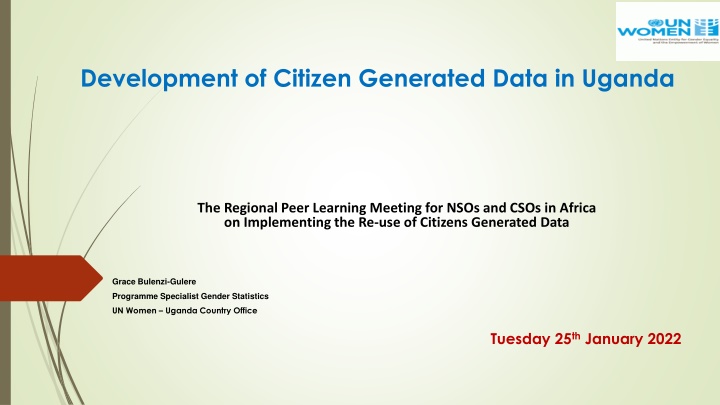
Empowering Uganda through Citizen Generated Data Development
"Learn about how UN Women is supporting Uganda in developing citizen-generated data to enhance evidence-based policy making and achieve sustainable development goals, with a focus on gender equality. Explore the collaborative efforts with UBOS and other stakeholders to integrate gender perspectives and improve data quality for informed decision-making."
Download Presentation

Please find below an Image/Link to download the presentation.
The content on the website is provided AS IS for your information and personal use only. It may not be sold, licensed, or shared on other websites without obtaining consent from the author. If you encounter any issues during the download, it is possible that the publisher has removed the file from their server.
You are allowed to download the files provided on this website for personal or commercial use, subject to the condition that they are used lawfully. All files are the property of their respective owners.
The content on the website is provided AS IS for your information and personal use only. It may not be sold, licensed, or shared on other websites without obtaining consent from the author.
E N D
Presentation Transcript
Development of Citizen Generated Data in Uganda The Regional Peer Learning Meeting for NSOs and CSOs in Africa on Implementing the Re-use of Citizens Generated Data Grace Bulenzi-Gulere Programme Specialist Gender Statistics UN Women Uganda Country Office Tuesday 25th January 2022
UN Women under the Global Flagship Initiative Making Every Woman and Girl Count implementation and monitoring of the SDGs through better production and use of gender statistics (Women Count) has supported Uganda in the efforts of prioritization of investment in development of statistics to ensure evidence-based policy, planning, monitoring and reporting national and international development commitments addressed to GEWE and delivery of the SDGs. Citizen Generated Data (MEWGC): Supporting the Development of Data from Non- Traditional Data Sources UN Women has supported efforts to develop data from non- traditional data sources including Citizen Generated Data (CGD) produced by Civil Society Organisations (CSOs) to complement official statistics.
Citizen Generated Data UN Women has established a partnership with UBOS to support the development and implementation of the National Strategy for Development of Statistics (NSDS) known as the Plan for National Statistical Development (PNSD) framework to ensure integration of gender perspectives in Data production chain and ensure evidence- based policy, planning, intervention design and reporting GEWE in the delivery of SDGs. Development of Data from Non- Traditional Data Sources UN Women has provided technical and financial support to UBOS and in partnership strengthened capacity of the NSS in the generation of gender data for evidence-based policy, planning and decision making and reporting country commitments. MDAs, LGs, and CSOs capacity to produce and use quality data.
Citizen Generated Data UN Women worked in partnership with UBOS to provide technical and financial support MDAs and have integrated gender perspectives and data requirements in the country planning, budgeting and reporting framework to support delivery of the development frameworks. This is evident in the third Plan for National Statistical Development (PNSD III 2021-2025) with aligned MDA, HLG and CSO strategic plans for statistics; the National Development Plan (NDP III 2021-2025) and associated Programme Implementation Action Plans (PIAPs 2021-2025), the United Nations Sustainable Development Cooperation Framework (UNSDCF 2021- 2025) and with a UN Joint Programme on data and Statistics being designed. All frameworks address GEWE for delivery SDGs. Development of Data from Non- Traditional Data Sources
Citizen Generated Data UN Women has enhanced capacity of CSOs to produce and use data for evidence-based policy, planning and decision making and reporting country commitments. Building on prior work by Development Network of Indigenous Voluntary Associations (DENIVA) on the development and implementation of the first and second strategic plan for statistics from (2007-2012 and 2013-2028) within the framework of the PNSD. Development of Data from Non- Traditional Data Sources With support from UN Women and UBOS more CSOs are being supported to develop Strategic Plans for Statistics for implementation within the PNSD framework.
Overall challenges encountered by CSOs in producing Citizen Generated Data (CGD) Lack of financial, human and infrastructural resources to support statistical development Absence of a designated staff and focal person for statistics Change in management and high staff turnover affecting the staff statistical capacity and reversed progress attained in the development and production of statistics Lack of continuous technical capacity to support statistical development Timely access to information
How to overcome the challenges Mobilise All stakeholders including partnerships with defined Roles and Responsibilities as players in the efforts to address CGD challenges. Stakeholders include Government, UN, CSOs, Private Sector and development partners, media, research and Academia etc. Deliberate effort to strengthen capacity of UBOS to support CSOs to develop quality CGD to complement official statistics.
The systematic approach to development of CGD through UN Women support to UBOS and the NSS Development of a Guideline/Toolkit for CGD adopting the global and regional model to ensure alignment and comparability at the various levels. Integration and alignments of CGD requirements in the PNSD III; NDP III, UN Women SN; UNSDCF frameworks to ensure production and use of inclusive data for evidence-based planning and decision making. Integration of CGD data and indicator requirements in the planning framework at various levels (Government-MDA & LGs, UN, Civil Society and Private Sector) through definition, integration and alignment of CGD requirements in indicator frameworks such as the National Priority Gender Equality Indicators (NPGEIs) of SDG5; National Standard Indicator (NSI), National Development Plan Results and Reporting (NDP III-RRF) and Programme implementation Action Plans (NDP-PIAPs); United Nations Sustainable Development Cooperation Framework (UNSDCF-RRF), and SDG indicator Frameworks.
The systematic approach to development of CGD through UN Women support to UBOS and the NSS Attract, monitor and report resources mobilization, allocation and utilization in effective service delivery. Integration of CSOs in the data management and coordination structures of the NSS; for example, constitution and operationalization of CSO-inter Agency Group. Integration of the CGD reporting in the Government Annual Performance Report (GAPR). Integrate CGD requirements in the development and implementation of the NSS Capacity Building Programme for Gender Statistics to strengthen capacity of CSOs to produce and use quality data to complement official statistics.
Key Questions 1. Which stakeholders are relevant for consultation on the priority CGD to meet vast user need at community, local government, national and international level? 2. 3. What data/information is needed for internal decision-making (organization)? What data/information is necessary for performance monitoring and global reporting (NDP, SDG)? What critical targets or indicators will signal progress on the intervention? 4. 5. Who must participate to trigger demand for better services, empowerment opportunities, rights etc, using the data/statistical information?
Possible Responses 1. Identify and map out key potential users of the data/information from the programme intervention at community, local and central government. 2. Understand the context and situation that surrounds the issue behind the intervention and therefore the data/information (indicators) needed for SDG 5 and other gender related SDGs. 3. Discuss CGD user priorities and expectations in respect to quantity, quality, timeliness and access. 4. Ensure involvement of the women and girls in their different categories following the HRBAD the Poor, having functional disabilities, living with HIV/AIDs, vulnerable to determine data gaps.

